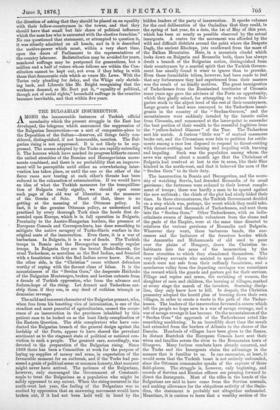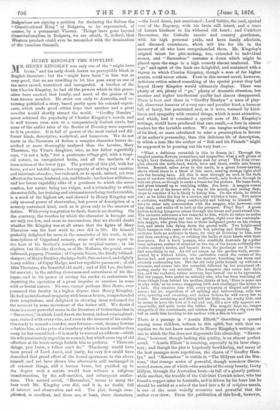THE BULGARIAN INSURRECTION.
j‘,_MONG the innumerable instances of Turkish official mendacity which the present struggle in the East has developed, the telegram which announced the suppression of the Bulgarian Insurrection—as a sort of companion-piece to the Deposition of the Sultan—deserves, all things fairly con- sidered, distinguished, if not honourable, mention. The Bul- garian rising is not suppressed. It is not likely to be sup- pressed. The means adopted by the Turks are rapidly extending it. The horrors which have marked its progress hitherto exceed the united atrocities of the Bosnian and Herzegovinian move- ments combined, and there is no probability that an improve- ment will be perceptible until either an overwhelming inter- vention has taken place, or until the one or the other of the fierce races now tearing at each other's throats has been reduced to the exhaustion of extermination. If we would have an idea of what the Turkish measures for the tranquillisa- tion of Bulgaria really signify, we should open some such page of the old war of liberation as the massacre of the Greeks of Scio. Short of that, there is no getting at the meaning of the Ottoman policy. In fact, it is the genuine Ottoman policy, as understood and practised by every thorough Turk since the horde first de- scended upon Europe, which is in full operation in Bulgaria. Proximity to the Austro-Hungarian borders, the presence of European Consuls and Correspondents, has done something to mitigate the native savagery of Turko-Slavic warfare in the original seats of the insurrection. Even there, it is a war of barbarians. In Bulgaria, it is a war of fiends. The Turkish troops in Bosnia and the Herzegovina are mostly regular troops. In Bulgaria they are the brutal Bashi-Bazouk, the cruel Tscherkess, as merciless as the Red Indian, and frenzied with a fanaticism which the Red Indian never knew. Nor, on the other side, is the " Christian " cause without defenders worthy of coping with the fiercest clans of Islam. It is the mountaineers of the " Sredna Gora," the desperate Haidouks of the Bulgarian Montenegro, broken and lawless outcasts from a decade of Turkish oppression, who form the advance and forlorn-hope of the rising. Let Arnaut and Tscherkess out- strip them if they can, in any deed of ruthless triumph or demoniac revenge.
The mild and innocent character of the Bulgarian peasant, who, when free from his besetting vice of intoxication, is one of the steadiest and most peaceful of agriculturists, caused the occur- rence of an insurrection in the provinces inhabited by this patient race to be looked on as the least likely complication of the Eastern Question. The able conspirators who have con- ducted the Bulgarian branch of the general design against the lordship of the Porte, appear to have shared the prevalent sentiment as to the stagnant state of political or national con- viction in such a people. The greatest care, accordingly, was devoted to the preparation of the Bulgarian rising. Since 1868 there has been a Committee at work for the purpose of laying up supplies of money and arms, in expectation of the favourable moment for an outbreak, and if the Turks had pos- sessed a grain of political sense or common honesty, that moment might never have arrived. The patience of the Bulgarians, however, only encouraged the Government of Constanti- nople to treat the Bulgarians as a population who might be safely oppressed to any extent. When the rising occurred in the north-west last year, the feeling of the Bulgarians was so excited by oppression that an answering movement would have broken out, if it had not been held well in hand by the ' hidden leaders of the party of insurrection. It speaks volumes I for the cool deliberation of the Omladina that they could, in ; the spring of last year, fix a date, the let of May of this year, ; which has been as nearly as possible observed by the actual insurgents. A centre for the movement was afforded by the wild and difficult districts around the point where the Despot° Dagh, the ancient Rhodope, juts southward from the mass of the Balkan Mountains. Here, in a mountain citadel which looks down on Bulgaria and Roumelia both, there has always dwelt a branch of the Bulgarian nation, distinguished from their countrymen by a martial spirit that the Turkish Govern- ment has usually found it wiser to ignore than to provoke. Even these formidable tribes, however, had been made to feel that any forbearance they had experienced from their masters was the result of no kindly motives. The great immigration of Tscherkesses from the Russianised territories of Circ,assia some years ago gave the advisers of the Porte an opportunity, which they gladly seized, for attempting to reduce this Bul- garian stock to the abject level of the rest of their countrymen. Large grants of land were conveyed to the Tscherkess immi- grants in the country of the " Sredna-Gorzen," and the mountaineers were suddenly invaded by the fanatic exiles from Circassia, and summoned at the lance-point to surrender the best portion of their wealth to the resentful fugitives from the "yellow-haired Giaours " of the Tsar. The Tscherkess met his match. A furious "little war" of mutual massacres broke out, and the Circassians were fain to petition for settle- ments among a race less disposed to respond to throat-cutting with throat-cutting, and burning and impaling with burning and impaling. Such was the population among whom the news was spread about a month ago that the Christians of Bulgaria had resolved at last to rise in arms, like their Slav kindred in the north-west, and that it behoved the men of the " Sredna Gora" to do their duty.
The insurrection in Bosnia and Herzegovina, and the neces- sity of watching Servia, had denuded Roumelia of its usual garrisons ; the fortresses were reduced to their lowest comple- ment of troops ; there was hardly a man to be spared against the new outbreak ; the chiefs of the plot had nicely bided their time. In these circumstances, the Turkish Government decided on a step which was, perhaps, the worst which they could take. They armed several thousands of Tscherkesses, and sent them into the " Sredna Gora." Other Tscherkesses, with an indis- criminate swarm of desperado volunteers from the slums and the gaols of the Empire, were at the same time directed to reinforce the various garrisons of Roumelia and Bulgaria. Wherever they went, these barbarous bands, the suc- cessors and the imitators of the ferocious hordes which the Amuraths and Mohammeds of old used to pour over the plains of Hungary, drove the Christian in- habitants into the arms of the insurrection by the fierce atrocities to which they abandoned themselves. The very railway servants who assisted to speed them on their march were not safe from their ruffianly fanaticism, and a murderous volley from the departing carriages was sometimes the reward which the guards and porters got for their services. Pillage and rapine and arson, the ravishing of women, the slaughter of men and children, the burning of villages, marked at every stage the march of the invaders. Scorning discip- line, they only knew how to kill. In despair, the Christian peasantry adopted the horrid plan of burning down their own villages, in order to create a waste in the path of the Tscher- kesses. The leaders of the insurrection favoured a course which left the people no hope save in a war of savage revenge, and a war of savage revenge it has become. On the mountaineers of the " Sredna Gora" the approach of the Tscherkesses acted like something maddening. In an incredibly short time the revolt had extended from the borders of Albania to the shores of the Danube. Hundreds of villages have been given to the flames. In distant Rustchuk the European Consuls have sent their wives and families across the river to the Roumanian town of Giurgevo. Many furious combats have already occurred, and the Turks and the Insurgents claim the advantage in the manner that is familiar to us. In one encounter, at least., it would seem that the Turkish boast is not entirely unfounded, since the Ottoman commander speaks of the capture of three field-pieces. The struggle is, however, only beginning, and crowds of Servian and Russian officers are pressing forward to direct the Insurgents. Most of the rifles in the hands of the Bulgarians are said to have come from the Servian arsenals, and making allowance for the ubiquitous activity of the Omla- dina, the statement is probably not altogether unfounded. Meantime, it is curious to learn that a wealthy section of the Bulgarians are signing a petition for declaring the Sultan the "Constitutional King" of Bulgaria, to be represented, of course, by a permanent Viceroy. Things have gone beyond Constitutionalism in Bulgaria, we are afraid, if, indeed, that Wstern product could ever be reconciled with the domination of the tameless Osmanli.































 Previous page
Previous page